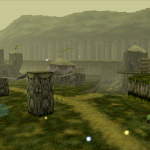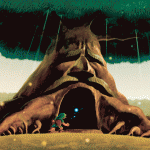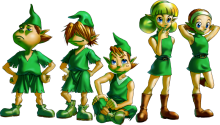Why Life in Kokiri Forest Would not be as Good as it Sounds
Posted on April 14 2014 by Legacy Staff
 Few Zelda games, or games in general, have made as big of an impact on the world of gaming as Ocarina of Time. While all of the areas in this game are memorable, intriguing and challenging, none are more important than Kokiri Forest. This wooded village might seem like a wonderful place in which to live, especially since the game sets it up to be nothing short of an in-game utopia. However, the personal fairies and the lack of any real responsibilities cannot change the fact that Kokiri Forest would be a horrible place in which to live, especially for the Kokiri. Hit the jump to find out why!
Few Zelda games, or games in general, have made as big of an impact on the world of gaming as Ocarina of Time. While all of the areas in this game are memorable, intriguing and challenging, none are more important than Kokiri Forest. This wooded village might seem like a wonderful place in which to live, especially since the game sets it up to be nothing short of an in-game utopia. However, the personal fairies and the lack of any real responsibilities cannot change the fact that Kokiri Forest would be a horrible place in which to live, especially for the Kokiri. Hit the jump to find out why!
The first reason that life in Kokiri Forest isn’t quite as good as one might expect is because of the dangers which inhabitants of the area would constantly be exposed to. Most of these hazards wouldn’t be considered dangerous at all on regular terms, but in this case, the citizens of the area are all children and always will be. With this in mind, regular elements of the landscape such as rocks, streams, tall grass and high cliffs suddenly have potential to do serious damage. Apart from the hazards of falling from rooftops and bashing one another’s heads in with rocks, there is also the danger of the Lost Woods. Any adult would know not to go wandering into this death trap of a maze, but as we have already discussed, the Kokiri are children. Their reasoning skills aren’t quite as refined as those of the adult races. However, the Kokiri aren’t really to blame for this; their only form of adult supervision is a tree, which leads me to my next point.
 As anyone who’s ever been a babysitter, teacher, camp counselor or parent will know, children need to be paid a lot of attention, or else they can get into some serious trouble. Unfortunately for the Kokiri, the only parental figure that they have is incapable of moving, and doesn’t even seem to communicate with them very often. The Great Deku Tree may be wise, and the game has stated that he does care for the Kokiri, but there’s no way that he could, say, set a broken arm or build a fort with them. It seems that they only talk to him if he gives them a special invitation. That means that he wouldn’t comfort them if they had a nightmare or give them any sort of moral guidance at all. These children are being forced to take care of themselves, without any support other than that of their friends. That’s a lot of pressure for a group of kids to be under. If one of them falls off of the roof a house – which inexplicably has a ramp leading up to it – and gets a concussion, his or her friends are going to have to try to heal him or her without any background medical knowledge at all. What’s worse is that, without any forceful leadership, the Kokiri must make up their own rules and govern themselves as best they can. This is commonly known as anarchy. The Kokiri are lucky that the worst conflict they have is with Mido as he forces them to do chores for him. Since they have no parents, they must feel very lonely and depressed. Overall, life for these orphaned children would be extremely difficult, to say the least.
As anyone who’s ever been a babysitter, teacher, camp counselor or parent will know, children need to be paid a lot of attention, or else they can get into some serious trouble. Unfortunately for the Kokiri, the only parental figure that they have is incapable of moving, and doesn’t even seem to communicate with them very often. The Great Deku Tree may be wise, and the game has stated that he does care for the Kokiri, but there’s no way that he could, say, set a broken arm or build a fort with them. It seems that they only talk to him if he gives them a special invitation. That means that he wouldn’t comfort them if they had a nightmare or give them any sort of moral guidance at all. These children are being forced to take care of themselves, without any support other than that of their friends. That’s a lot of pressure for a group of kids to be under. If one of them falls off of the roof a house – which inexplicably has a ramp leading up to it – and gets a concussion, his or her friends are going to have to try to heal him or her without any background medical knowledge at all. What’s worse is that, without any forceful leadership, the Kokiri must make up their own rules and govern themselves as best they can. This is commonly known as anarchy. The Kokiri are lucky that the worst conflict they have is with Mido as he forces them to do chores for him. Since they have no parents, they must feel very lonely and depressed. Overall, life for these orphaned children would be extremely difficult, to say the least.
 Finally, the last reason why living in Kokiri Forest wouldn’t be as fun as one might think lies not in the forest itself, but in the people who live there. The Kokiri never grow up, which means that they never have a chance to increase their mental power or develop their physical abilities. Also, as children, they lack any desire to improve themselves, something that a person tries to achieve during adolescence. Since they never mature, they can never get married and have a family. This is especially sad, since it is indicated by Mido’s feelings for Saria, that the Kokiri can fall in love with each other, to some degree. These people might begin to feel that their lives have no meaning, and might question their existence. To top it off, since the Kokiri never grow old, there is no evidence that they can die. Not only would the Kokiri feel that their life was pointless, they would go on feeling that way for eternity.
Finally, the last reason why living in Kokiri Forest wouldn’t be as fun as one might think lies not in the forest itself, but in the people who live there. The Kokiri never grow up, which means that they never have a chance to increase their mental power or develop their physical abilities. Also, as children, they lack any desire to improve themselves, something that a person tries to achieve during adolescence. Since they never mature, they can never get married and have a family. This is especially sad, since it is indicated by Mido’s feelings for Saria, that the Kokiri can fall in love with each other, to some degree. These people might begin to feel that their lives have no meaning, and might question their existence. To top it off, since the Kokiri never grow old, there is no evidence that they can die. Not only would the Kokiri feel that their life was pointless, they would go on feeling that way for eternity.
This is a pretty depressing thought, and it is certainly unpleasant to consider. However, as one final comment, it seems that the Kokiri do enjoy their lives, and don’t seem to give it much thought. So, while their conditions of life aren’t ideal, they are fairly naive and don’t think pessimistically about it at all. But what do you think? Is life in Kokiri Forest so bad after all? Do you think the children should take action, and try to make things better for themselves? Let us know what you think in the comments!



